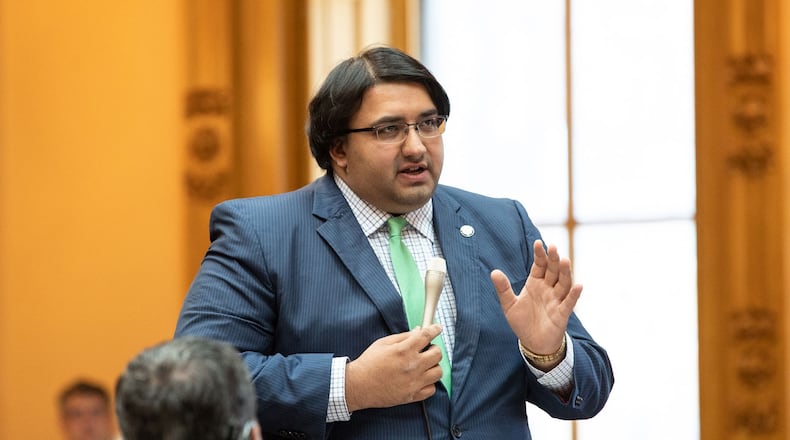It specifies that proof of citizenship could include current or expired Ohio driver’s licenses or state ID; other states’ IDs or driver’s licenses; birth certificates; current or expired U.S. passports; or certificates of naturalization.
Ohioans registering to vote under current law must provide a driver’s license or state identification number, or the last four digits of their Social Security number.
“Securing Ohio’s elections must be our top priority. This bill will stop illegal immigrants from voting in our elections,” Antani wrote in a press release while criticizing President Joe Biden for allowing “an invasion of illegal immigrants into our country.”
“We must take every precaution to ensure they don’t vote in our elections,” said Antani, whose legislative proposals have skewed toward election integrity in recent months.
It is illegal in the U.S. for noncitizens to vote in federal elections and the Ohio Constitution prohibits noncitizens from voting in any elections. People must attest that they are citizens when they register to vote, but federal law prohibits requiring proof of citizenship for federal elections.
In August the U.S. Supreme Court allowed Arizona’s proof of citizenship requirement to stand for those registering on Arizona state forms but forbids the state from denying those who registered on a federal form from voting for president or by mail. The legal battle over the law will continue in lower courts.
Voter fraud by American citizens or noncitizens in the U.S. is exceedingly rare, according to studies by groups such as the liberal-leaning Brennan Center for Justice, the conservative Heritage Foundation and the libertarian-leaning CATO Institute. Ohio has about 8 million registered voters.
Antani’s bill aims to provide another layer of protection to ensure that non-citizens can’t improperly make it onto the state’s voter rolls.
A recent Dayton Daily News investigation found elections officials in three area counties, the Warren County prosecutor and a local immigration attorney said mistakes by the Ohio Bureau of Motor Vehicles offices have resulted in some noncitizens being registered to vote when they get their state ID or driver’s license, including when the person says they are not a citizen. Those interviewed said none of those people attempted to vote.
Antani’s bill comes amid a flurry of attention on the potential issue of noncitizens voting in Ohio, which has been led by Republican Secretary of State Frank LaRose, who earlier this year said the legislature should require proof of citizenship to register.
Critics question why in the lead up to the Nov. 5 election Republicans in Ohio and other states are amplifying the issue of noncitizens voting even though voting fraud by anyone, including noncitizens, rarely occurs.
“Ohio has lots of real problems, but this is not one of them. You have to wonder why some elected officials are devoting so much attention to a problem that doesn’t exist,” said Ellis Jacobs, retired senior attorney for Advocates for Basic Legal Equality (ABLE) in Dayton, in a September interview.
When he was still at ABLE Jacobs analyzed statewide voter fraud referrals, including of noncitizens, in Ohio’s 2016 election.
“What I found was that most of them could be explained by misunderstanding or miscommunications. And that only a small handful were people voting that were not allowed to be voting. And only a small group of people wound up being prosecuted,” Jacobs said.
Antani’s proposal comes the week after Ohio Attorney General Dave Yost announced indictments against six people — one of whom is dead — for allegedly illegally voting in Ohio elections when they were non-U.S. citizens between 2008 and 2020. Those cases stemmed from a total of 138 allegations forwarded by LaRose.
After Cuyahoga County Prosecutor Michael C. O’Malley last week denounced Yost for indicting a dead man, Yost’s office said the indictment of the dead man would be dismissed.
For more stories like this, sign up for our Ohio Politics newsletter. It’s free, curated, and delivered straight to your inbox every Thursday evening.
Avery Kreemer can be reached at 614-981-1422, on X, via email, or you can drop him a comment/tip with the survey below.


